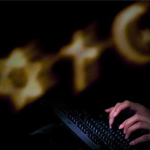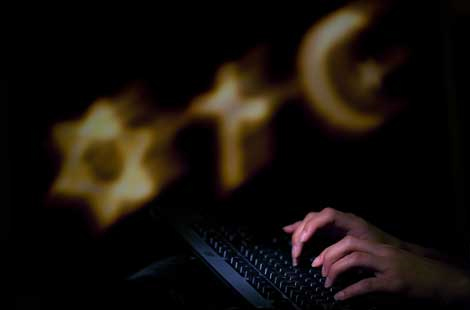Religion and reporting

Religion and reporting
- September 13, 2010
- Director of UCI’s Center for the Study of Democracy assesses US media coverage of stories involving faith
 The U.S. may be a secular country, but religion permeates public discourse on issues
ranging from abortion rights to the wars in Iraq and Afghanistan. And where religion
is concerned, emotions can run high – sometimes clouding the facts.
The U.S. may be a secular country, but religion permeates public discourse on issues
ranging from abortion rights to the wars in Iraq and Afghanistan. And where religion
is concerned, emotions can run high – sometimes clouding the facts.
Controversies over a proposed mosque near Ground Zero and President Obama’s religious affiliation are cases in point, underscoring the importance of unbiased, accurate reporting on religion-tinged subjects.
With this goal in mind, UC Irvine’s Center for the Study of Democracy in the School of Social Sciences contributed to the recently published Faith, Politics & Press in Our Perilous Times, edited by Stephen Burgard, director of Northeastern University’s School of Journalism.
Here, center director and political science professor Bernard Grofman offers his thoughts on religion, media and UCI’s role in producing the anthology, which features an essay by UCI Distinguished Professor of English Jack Miles.
Q: How was the CSD involved with this book?
A: Several of the chapters are lectures given at UCI under the auspices of the CSD, and
with those presentations in mind, the project was conceived while Burgard was a scholar-in-residence
at UCI as a CSD research fellow – something he’s done every winter quarter for the
past several years. When he’s here, Burgard coordinates the CSD’s Religion, Media
& Politics Lecture Series and colloquiums.
Q: How could American media do a better job covering religion?
A: The key is to recognize that the world’s major religions are not monolithic; they
have multiple currents within them. This is particularly important in understanding
the Muslim community. In addition, religion is constantly changing. Today’s evangelical
Christians, for example, are not the evangelical Christians of the Reagan era. The
religious composition of the world – not just the U.S. – has been changing too. It
would be helpful if more media stories took a comparative (and fact-based) perspective.
Q: A recent poll found that almost one in five Americans believe, erroneously, that
President Obama is Muslim. What role do the media play, if any, in perpetuating this
idea?
A: Here one cannot blame the traditional media, except perhaps for not playing more of
a debunking role. Rather, these totally false, conspiratorial beliefs are spread via
the blogosphere and personal communication – and seem incredibly resistant to factual
evidence to the contrary.
Q: How would you rate coverage of the proposed mosque near Ground Zero?
A: Some media have done a good job in pointing out that there were and still are a multiplicity
and diversity of businesses near Ground Zero and that the area is – unlike, say, the
National Mall in Washington, D.C. – not effectively consecrated ground limited in
what kinds of things may go there. Churches, synagogues and mosques are, unless perverted
to serve political ends, places of worship. Certainly, they are at least as appropriate
near Ground Zero as, say, liquor stores. However, nobody proposes banning liquor stores
from the area. The notion that a mosque near the site somehow contaminates the meaning
of 9/11 seems strange. Imagine how Americans might feel if Japanese right-wingers
objected to the building of a Christian church in Hiroshima. The press, in its quest
for neutrality, has treated this as an issue with two sides, each presenting reasoned
arguments, without emphasizing how it’s been blown all out of proportion for partisan
political motives.
Q: A Florida pastor received a lot of media attention (and condemnation) last week
for his proposed Quran burning on the anniversary of 9/11. What did you make of this
coverage and concerns that it might inflame anti-Western sentiment in the Muslim world?
A: Many years back the distinguished American historian Daniel Boorstin talked about
“pseudo-events,” meaning those staged solely for the purpose of the media coverage
of them. Unlike the tree in the forest in the famous Zen koan – which presumably would
fall even if no one was looking – if the media weren’t covering Terry Jones’ staged
9/11 event, he wouldn’t be doing it. Many holy books contain great wisdom but also
reflect the times in which they were written, and thus contain at least some language
offensive to modern sensibilities, e.g., about gender relations, slavery or racism.
Should we burn certain 19th century papal encyclicals because they express strong
hostility to democracy? The only reason for burning the Quran on 9/11 is that the
person doing it is a publicity-seeking demagogue.
Q: What do you think is currently the most misunderstood religion, in terms of media
coverage?
A: It’s not Islam, Judaism or even Mormonism but probably Buddhism, since we rarely hear
anything about it.
— Laura Rico, University Communications
— Photo illustration by Steve Zylius / University Communications
Link to campus feature: http://www.uci.edu/features/2010/09/feature_religionbook_100913.php
Share on:




connect with us